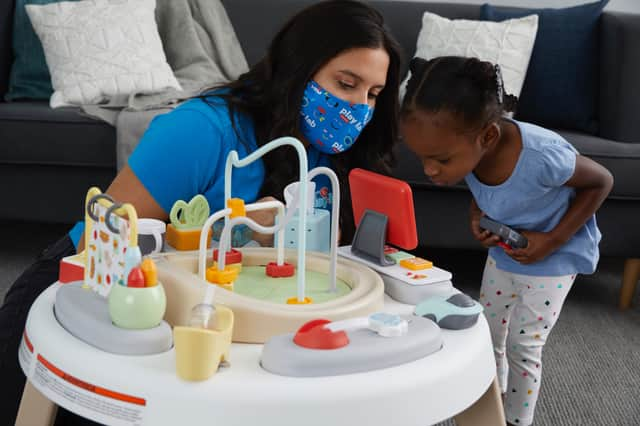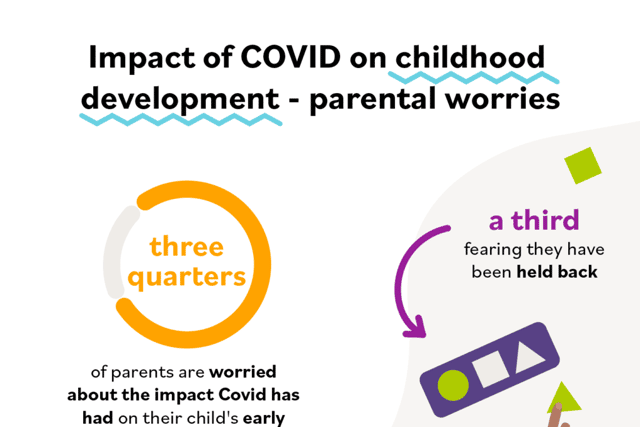Three quarters of parents are worried about the impact Covid has had on their child's early years development


A poll of 1,000 parents who have had a baby in the last five years found 26 per cent are concerned about their little one’s speech as a result of the pandemic, while 35 per cent are worried about how their emotional intelligence may have been impacted.
It also emerged seven in 10 don’t completely understand what should be expected of their youngster at their age, as they’ve had less interaction with other parents and families themselves.
Kelly Philp, spokesperson for Fisher-Price Play Lab, which jointly commissioned the research along with national charity Family Action, said: “Two years on and young children have been impacted hugely by the pandemic.
“There is a lot to be said for social interaction with others and the development it brings – and equally, the missed opportunities and repercussions there are as a result of not experiencing it.”
It also emerged that the ability to play with others, understand their own emotions and literacy skills were other concerns parents had about their child’s development.
Their child meeting fewer new people, seeing less of friends or family, than they would usually, and not attending groups for children the same age had the biggest impact on their child, according to their mums and dads.
Fewer visits to public hot spots, spending more time at home and generally being out and about less were other issues caused by the pandemic.
Help needed from development experts
As a result, 43 per cent would welcome help from early childhood development experts to ensure their child is meeting milestones that might have been impacted by restrictions in the past couple of years.
At the moment, parents and carers typically head online or to their health visitor for advice on their child’s development – with a quarter speaking to friends with children to compare.
In response to these new findings, Family Action has joined forces with Fisher-Price Play Lab in an initiative which will provide funding, resources and early childhood development-focused toys proven to help with social, language, motor skills and numeracy.
The year-long partnership will comprise a range of activities and resources focused on supporting young children and their parents and carers with early childhood development (ECD) and reaching key milestones that may have been impacted during the pandemic.
It will focus on how caregivers can incorporate simple techniques through play in the home environment to help support children’s learning.
Family Action will also roll this learning out as a special programme at some of their centres.
David Holmes CBE, chief executive of Family Action, said: “Vulnerable families have been disproportionately affected by the impact of the global pandemic, facing a variety of challenges brought about by the uncertainty of the last two years.
“Family Action’s experience supporting families, parents and carers for the past 153 years tells us the best way to support them is to empower them with knowledge and resources.
“Our partnership with Fisher-Price will invest in that work, giving families the resources and opportunities to support their children’s development and build brighter futures.”


Separation anxiety
The study also found six in 10 parents spent more time at home with their child because of the pandemic – with 30 per cent feeling separation anxiety now as a result of the pandemic.
And 31 per cent of children experience the same feelings when saying goodbye to their parent or carer, with 74 per cent of those who experience separation anxiety either for themselves or their child believe this has been made worse by the pandemic.
The majority (65 per cent) look to help their child’s early years development by talking to them lots, buying educational toys and lots of play or activities.
However, 39 per cent feel they’ve missed out on quality time with their child because of pressures related to the pandemic.
Kelly Philp added: “As a cornerstone within Fisher-Price for 60 years, the Fisher-Price Play Lab has particular expertise in ECD and supporting families and young children.
"We are proud and honoured to be working with Family Action to support their important work on early childhood development throughout the UK at such an important time.
“This initiative with Family Action will empower parents and caregivers to help children thrive and get the best start to life.
"This is particularly important to us at Fisher-Price knowing what an important role play takes in their early years.”
Top 20 child development concerns from parents during the pandemic
1. Social interaction
2. Social skills
3. Ability to understand their emotions/feelings
4. Speech – saying words or crying, babbling squealing etc
5. Literacy skills – such as spelling their name or reading simple words
6. Communication understanding – such as ‘roll the ball’ or ‘throw the ball’
7. Recognising places – knowing where things are
8. Numeracy skills – such as sorting shapes or counting small numbers
9. Emotional intelligence
10. Movement – such as crawling, walking, jumping etc.
11. Attention span/ concentration
12. Self-awareness – such as laughing, making themselves known
13. Non-verbal communication – such as pointing, nodding etc.
14. Memory – ability to recall things that have happened or facts about people
15. Recognising faces
16. Imagination – ability to play
17. Sport/ exercise habits
18. Listening
19. Fine motor skills – such as stacking blocks
20. Muscular/ skeletal development